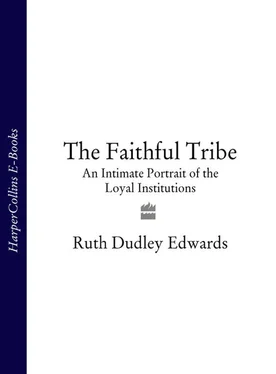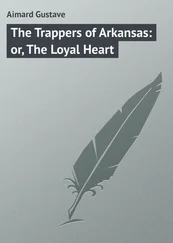I know from private and public sources the details of Orange ceremonies and rituals. * At their worst they are no more stupid than most ceremonials or rituals of guilds or fraternal societies seem to outsiders; they are certainly not sinister. Ritual accounts for less than 1 per cent of what goes on at an Orange Lodge – infinitesimal compared to what goes on among Freemasons. The most exciting event is an initiation, and mischievous brethren enjoy winding-up potential candidates by making mysterious references to ‘riding the goat’ (which is, in fact, a backwards acronym for ‘the ark of God’ † ) and hinting darkly at stringent tests of courage. There are physical aspects to the initiation (the travel) which involve a blindfolded candidate having to face certain tests and travails inspired by a biblical story; in tough urban areas, especially in England and Scotland, these might be occasionally on the exuberant side, but in general the experience is rather tame. ‘The initiation is a bit amusing,’ one young man remarked, ‘but when you come home you think it’s a bit silly.’ A less blasé brother describes the ceremony as ‘a heady mixture of folk memory, rural Ulster Protestant tradition and ancient ritual’, which is for many ‘a moving experience, a rite of passage from boy to manhood, the admission to an historic brotherhood bonded by centuries of blood, fire and persecution and a spiritual experience couched in terms of the language of the deliverance and pilgrimage of the children of Israel’. *
The written-down part of the initiation involves the sponsors leading the candidate into the Lodge Room, where the Worshipful Master reads out in full the qualifications of an Orangeman and establishes that the candidate assents to these and is seeking admission to the Orange institution of his own free will. The lodge members agree to his initiation, the chaplain says a prayer and the Worshipful Master then asks the candidate at considerable length if, inter alia, he promises allegiance to the sovereign, her successors and the constitution; assistance to the civil authorities when called upon; fidelity to brother Orangemen ‘in all just actions’; and a vow of silence about lodge proceedings to any but a brother Orangeman. There are the promises about religion and secret societies.
‘I don’t think there’s anything in there that would be offensive towards your Roman Catholic friends,’ said a senior Orangeman who was telling me about the ceremony. He then went on to read out one request of the Worshipful Master:
Do you promise, before this Lodge, to give no countenance, by your presence or otherwise, to the unscriptural, superstitious, and idolatrous worship of the Church of Rome? And do you also promise never to marry a Roman Catholic, never to stand sponsor for a child when receiving baptism from a priest of Rome, or allow a Roman Catholic to stand sponsor for your child at baptism? And do you further promise to resist, by all lawful means, the ascendancy, extension, and encroachments of that Church; at the same time being careful always to abstain from all unkind words and actions towards its members, yea, even prayerfully and diligently, as opportunity occurs, to use your best efforts to deliver them from error and false doctrine, and lead them to the truth of the Holy Word, which is able to make them wise unto salvation?
All that Orangemen can see or hear when they read such words are the injunctions to behave properly towards Roman Catholics. They are genuinely baffled that outsiders find such rules and language bigoted. * Perhaps the reason I have never taken offence is that I was brought up in the Republic of Ireland under the authoritarian and intolerant Irish Catholic Church and understand something of their traditional fears. Also, by the time I began to read the rules and regulations I had developed a great admiration and affection for many Orangemen.
‘As far as the Orange Order’s concerned,’ said an aged Worshipful Master to me, ‘it’s not a bigoted order. It’s a religious order, there to protect the religious beliefs of the Protestant people. In the very opening prayer you pray for your Roman Catholic brethren. I don’t dictate to the Roman Catholic man where he should go to church; I’m as happy with him going to his own as he is to mine. I’ll not condemn any man’s religion – except Paisley, for he’s divided everybody.
‘To me the Orange is a family and if a man would live to the qualifications of the Orangeman and to what he’s taught inside the four walls of an Orange hall, he would be fit to live a good life.’
Where lodge meetings are held
All over Ulster in villages and in the middle of nowhere there are little Orange Halls built of wood or brick, often with galvanized tin roofs. In Dromore, for instance, Orangemen used to meet in an old army hut that was a rapidly decaying tin shack on wooden stilts. Ulster Protestants are frugal people and the prospect of raising enough money to buy a site and erect a hall was daunting. Alf, the Worshipful Master, decided on drastic action. ‘I said this night, at a lodge meeting: “We must have a hall of our own. I’ll supply the material and I’ll pay the contractor and I’ll get paid some time.” The secretary came in the next morning and he said to me – the only time he ever give me any praise – he says: “Churchill the Second.”’
It took some time to find and buy the right site, and then they built a hall with a stage, which seated about three hundred so it could be used for socials and dances as well as band-practice. It was opened in 1953 in September; in December the north wall of the church collapsed and the church service was held in the hall for three years. Socials ended about twenty years ago; nowadays the hall is a venue for the Duke of Edinburgh’s Award scheme. In the fullness of time, the brethren repaid Alf; building that hall is an achievement which even forty years later he felt was a highlight of his life.
Most halls have been built mostly through jumble sales and sales of work and other unremitting labour by the ladies. Most would be smaller than Alf’s, though large enough to host the dances and conversazioni and teas that made Orange Halls important community centres until the advent of television and other major distractions. The furnishings are of the plainest: mostly wooden benches and trestle tables and the most spartan of spartan fixtures and fittings. There will always be a picture of the Queen and usually some representation of King Billy, and the lodge banner will be displayed on festive occasions.
In towns, the buildings are larger, since they often have to accommodate district or county functions, but austerity remains the norm. Brownlow House, the headquarters of the Royal Black Institution (Orange and Black men often share accommodation), was a fine house until it was torched, though it too was plainly furnished. The two-storey hall at Scarva is as luxurious as it gets, with the stained-glass window featuring King Billy, a spacious assembly-room and portraits and prints of Orange significance.
A 1960s building, the tall, narrow Orange HQ at 65 Dublin Road, Belfast, sets the tone for the whole organization. There are a few adornments, including a portrait of the Reverend Martin Smyth, ??, Grand Master for a quarter of a century, and some William-related pictures. A small room contains an interesting hotch-potch of archives, books and memorabilia, but for the most part the building consists of spartan offices. *
What happens at lodge meetings
Although the ritual and ceremonies in every Irish lodge are the same, the ambience and emphasis and what happens afterwards depend on where and who you are. I once sat in on a conversation between two Orangemen, one from Belfast and one from rural Tyrone, each of whom was amazed by the other’s revelations about his lodge. The Belfast Orangeman reckoned that although all his brethren were believing Protestants, 90 per cent of his lodge hadn’t been to church in years except for Orange services; he would expect churchgoers to join one of the lodges for committed, evangelical born-again Christians. His lodge was almost entirely social – more a drinking-club than anything else – although it kept to the strict rule that alcohol should not be consumed until after the formal meeting is over. Brethren paid about £60 a year in basic dues to cover rates and so on and a levy for Orange widows; any shortfall was made up by a night at the races or a big booze-up.
Читать дальше












